Living the Gospel
SEARCH BY TITLE
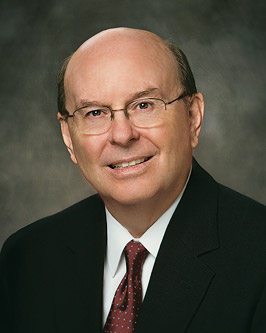 Can Ye Feel So Now?
Can Ye Feel So Now?
In my view, those of you in the rising generation are better prepared than any previous generation. Your knowledge of the scriptures is particularly impressive. However, the challenges your generation faces as you prepare for service are similar to those faced by all members of the Church. We are all aware the culture in most of the world is not conducive to righteousness or spiritual commitment. Throughout history, Church leaders have warned the people and taught repentance. In the Book of Mormon, Alma the Younger was so concerned about unrighteousness and lack of commitment that he resigned as chief judge, the leader of the people of Nephi, and concentrated all his efforts on his prophetic calling. In one of the most profound verses in all of scripture, Alma proclaims, “If ye have experienced a change of heart, and if ye have felt to sing the song of redeeming love, I would ask, can ye feel so now?” . . Today moral deterioration has escalated. One prominent writer recently said, “Everyone knows the culture is poisonous, and nobody expects that to change.” The constant portrayal of violence and immorality in music, entertainment, art, and other media in our day-to-day culture is unprecedented. This was dramatically described by a highly respected Baptist theologian when he stated, “The spiritual immune system of an entire civilization has been wounded.”It is not surprising that some in the Church believe they can’t answer Alma’s question with a resounding yes. They do not “feel so now.” They feel they are in a spiritual drought. Others are angry, hurt, or disillusioned. If these descriptions apply to you, it is important to evaluate why you cannot “feel so now.” Many who are in a spiritual drought and lack commitment have not necessarily been involved in major sins or transgressions, but they have made unwise choices. Some are casual in their observance of sacred covenants. Others spend most of their time giving first-class devotion to lesser causes. Some allow intense cultural or political views to weaken their allegiance to the gospel of Jesus Christ. Some have immersed themselves in Internet materials that magnify, exaggerate, and, in some cases, invent shortcomings of early Church leaders. Then they draw incorrect conclusions that can affect testimony. Any who have made these choices can repent and be spiritually renewed.
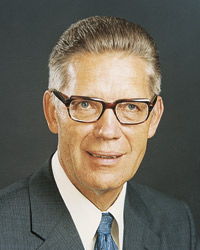 The Caravan Moves On
The Caravan Moves On
This is our goal and aim and purpose in life. Everything we do should please the Lord and further our strivings for salvation. And, the Lord be praised, there comes a time in the lives of faithful Saints when, having kept the faith and been true and faithful at all hazards, the Lord says to them: Thou shalt be exalted. These, then, are a few of the many tests of true discipleship. Now, I have what every true disciple has. It is called the testimony of Jesus. In our day it includes the revealed knowledge that the earthly kingdom—The Church of Jesus Christ of Latter-day Saints—will triumph. In this connection may I set before you this illustration: The Church is like a great caravan—organized, prepared, following an appointed course, with its captains of tens and captains of hundreds all in place. What does it matter if a few barking dogs snap at the heels of the weary travelers? Or that predators claim those few who fall by the way? The caravan moves on. Is there a ravine to cross, a miry mud hole to pull through, a steep grade to climb? So be it. The oxen are strong and the teamsters wise. The caravan moves on. Are there storms that rage along the way, floods that wash away the bridges, deserts to cross, and rivers to ford? Such is life in this fallen sphere. The caravan moves on. Ahead is the celestial city, the eternal Zion of our God, where all who maintain their position in the caravan shall find food and drink and rest. Thank God that the caravan moves on!
 “Come unto Me with Full Purpose of Heart, and I Shall Heal You”
“Come unto Me with Full Purpose of Heart, and I Shall Heal You”
As a seven-year-old boy living in the Arabian Peninsula, I was consistently told by my parents to always wear my shoes, and I understood why. I knew that shoes would protect my feet against the many threats to be found in the desert, such as snakes, scorpions, and thorns. One morning after a night’s camping in the desert, I wanted to go exploring, but I did not want to bother with putting on my shoes. I rationalized that I was only going for a little wander and I would stay close by the camp. So instead of shoes, I wore flip-flops. I told myself that flip-flops were shoes—of a sort. And anyway, what could possibly happen? As I walked along the cool sand—in my flip-flops—I felt something like a thorn going into the arch of my foot. I looked down and saw not a thorn but a scorpion. As my mind registered the scorpion and I realized what had just happened, the pain of the sting began to rise from my foot and up my leg. I grabbed the top of my leg to try and stop the searing pain from moving farther, and I cried out for help. My parents came running from the camp. As my father battered the scorpion with a shovel, an adult friend who was camping with us heroically tried to suck the venom from my foot. At this moment I thought that I was going to die. I sobbed while my parents loaded me into a car and set off across the desert at high speed toward the nearest hospital, which was over two hours away. The pain all through my leg was excruciating, and for that entire journey, I assumed that I was dying. When we finally reached the hospital, however, the doctor was able to assure us that only small infants and the severely malnourished are threatened by the sting of that type of scorpion. He administered an anesthetic, which numbed my leg and took away any sensation of pain. Within 24 hours I no longer had any effects from the sting of the scorpion. But I had learned a powerful lesson. I had known that when my parents told me to wear shoes, they did not mean flip-flops; I was old enough to know that flip-flops did not provide the same protection as a pair of shoes. But that morning in the desert, I disregarded what I knew to be right. I ignored what my parents had repeatedly taught me. I had been both lazy and a little rebellious, and I paid a price for it. As I address you valiant young men, your fathers, teachers, leaders, and friends, I pay tribute to all who are diligently striving to become what the Lord needs and wants you to be. But I testify from my own experience as a boy and as a man that disregarding what we know to be right, whether through laziness or rebelliousness, always brings undesirable and spiritually damaging consequences. No, the scorpion did not in the end threaten my life, but it caused extreme pain and distress to both me and my parents. When it comes to how we live the gospel, we must not respond with laziness or rebelliousness.
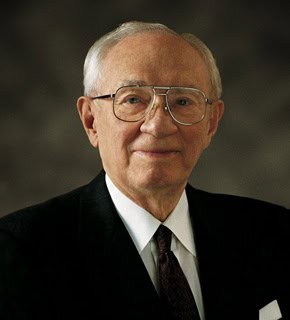 Don’t Drop the Ball
Don’t Drop the Ball
Some of you older men may remember the Rose Bowl football game of 1929, when a player named Roy Riegels recovered a fumble and ran almost the length of the field toward the goal of his opponent. He was tackled and brought down by one of his own team, preventing a touchdown. He had lost his sense of direction in a moment of stress. His mistake cost his team a victory. He was a great player. He lived to be eighty-four, but ever afterward he was remembered as the man who ran the wrong way. This phenomenon is not peculiar to sports. It happens every day in life. There is the student who thinks he is doing well enough, and then under the stress of the final exam, flunks out. There is the driver who all of his life has had a flawless record and then, in a moment of carelessness, is involved in a tragic accident. There is the trusted employee whose performance has been excellent, and then he succumbs to the temptation to steal a little from his employer. A mark is placed upon him which never seems to entirely disappear. There is the life lived with decency—and then comes the destructive, ever-haunting, one-time moral letdown. There is the outburst of anger that suddenly destroys a long-cherished relationship. There is the little sin that somehow grows and eventually leads to separation from the Church. In all of these, someone dropped the ball. He had the self-confidence, possibly even the arrogance, to think that he didn’t really have to try, that he could make it with only half an effort. But the ball passed through his hands and hit the ground, and he gave away the game. Or he thinks he makes a smart catch of someone else’s fumble and runs the wrong way, only to give victory to his opponents. It all points up the need to be constantly alert. It points up the importance of unrelenting self-discipline. It indicates the necessity of constantly building our strength against temptation. It warns us against the misuse of our time, especially our idle time.
 I Know It. I Live It. I Love It.
I Know It. I Live It. I Love It.
The first part of the statement is a self-assured, unapologetic declaration: “I’m a Mormon.” Just as the young woman I met in the grocery store was not afraid to let the world know she was a member of The Church of Jesus Christ of Latter-day Saints, I hope we will never be afraid or reluctant to acknowledge, “I’m a Mormon.” . . . The next part of the statement affirms, “I know it.” In today’s world, there are a multitude of activities, subjects, and interests vying for every minute of our attention. With so many distractions, do we have the strength, discipline, and commitment to remain focused on what matters most? Are we as well versed in gospel truths as we are in our studies, careers, hobbies, sports, or our texts and tweets? Do we actively seek to find answers to our questions by feasting on the scriptures and the teachings of the prophets? Do we seek the confirmation of the Spirit? The importance of gaining knowledge is an eternal principle. The Prophet Joseph Smith “loved knowledge for its righteous power.” He said: “Knowledge is necessary to life and godliness. … Hear, all ye brethren, this grand key: knowledge is the power of God unto salvation.” All truth and knowledge is important, but amidst the constant distractions of our daily lives, we must especially pay attention to increasing our gospel knowledge so we can understand how to apply gospel principles to our lives. As our gospel knowledge increases, we will begin to feel confident in our testimonies and be able to state, “I know it.” Next is the statement, “I live it.” The scriptures teach that we must be “doers of the word, and not hearers only.” We live the gospel and become “doers of the word” by exercising faith, being obedient, lovingly serving others, and following our Savior’s example. We act with integrity and do what we know is right “at all times and in all things, and in all places” no matter who may or may not be watching.
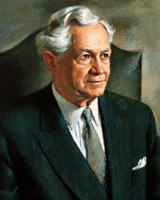 Individual Responsibility
Individual Responsibility
And what is this responsibility that rests upon every member of the Church? I turn to the 107th section of the D&C, and there find enumerated the duties of the various organizations of the priesthood, and I read in the 99th paragraph the following: “Wherefore now let every man learn his duty, and to act in the office in which he is appointed, in all diligence.” Two principles in that admonition stand out as the duty of the officers to whom this revelation was given. First, the learning the knowing what one’s duty is; second, to act in all diligence in the performance of that duty. To know one’s duty, to learn the truth, is the duty of every Latter-day Saint, of every man and woman in the world, including those outside of this Church. All mankind, I believe, are being impelled, lifted upward by that Spirit which makes them desire the truth. In the political world even, you find great men who have been searching for political truth, for truths that would relieve political situations. In the world of morality you find great reformers reaching out for truths that will alleviate harmful social conditions. . . The Latter-day Saints have learned the truth that the everlasting Gospel has been restored. And what does this knowledge bring to them? It brings to all, who have honestly and sincerely obeyed the principles of repentance and baptism, the gift of the Holy Ghost, which enlightens their minds, quickens their understandings, and imparts unto them a knowledge of Christ. The Latter-day Saints have a guide, a help, a means to assist in their acquisition of truth, in their desire to know what their duty is, that the world does not possess. And this guide is necessary; man cannot find out truth; he cannot find out God by intellect alone. It has been said that no man can find out God by a microscope. Reason alone is not a sufficient guide in searching for truth. There is another, higher, more sure guide than reason even.
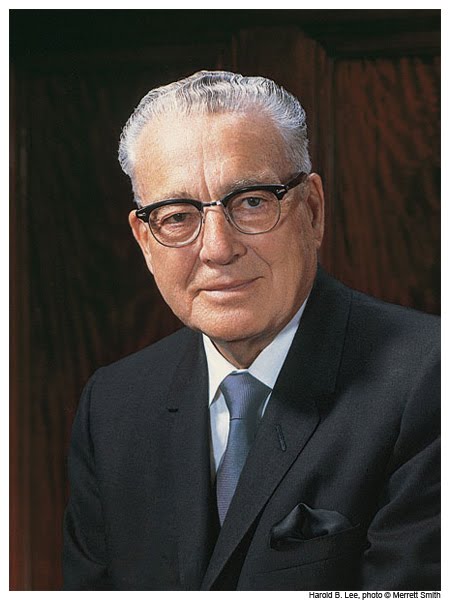 The Iron Rod
The Iron Rod
As an answer to those who may be wandering aimlessly, searching for something to satisfy their need and to end their state of confusion and emptiness, I would like to introduce a few thoughts by relating a remarkable vision which came to an ancient prophet by the name of Lehi—600 years before Christ. To the faithful members of the Church this will be an oft-related incident recorded in the Book of Mormon. To those not of our faith this may, if they will ponder seriously, be very significant in the light of many trends in our modern society. In this dream, or better called a vision, the prophet Lehi was led by a heavenly messenger through a dark and dreary waste to a tree laden with delicious fruit which proved to be very satisfying to his soul. He beheld a river of water nearby along which was a straight and narrow path leading to the tree laden with delicious fruit. Between the river bank and the path was a rod of iron, presumably to safeguard the travelers from falling off the narrow path into the river. . . The rod of iron as seen in the vision interpreted was the word of God, or the gospel of Jesus Christ. . . Wouldn’t it be a great thing if all who are well schooled in secular learning could hold fast to the “iron rod,” or the word of God, which could lead them, through faith, to an understanding, rather than to have them stray away into strange paths of man-made theories and be plunged into the murky waters of disbelief and apostasy? . . Conversion must mean more than just being a “card carrying” member of the Church with a tithing receipt, a membership card, a temple recommend, etc.
 It’s True Isn’t It? Then What Else Matters
It’s True Isn’t It? Then What Else Matters
Then-Elder Gordon B. Hinckley spoke of meeting a young naval officer from Asia. The officer had not been a Christian, but during training in the United States, he had learned about the Church and was baptized. He was now preparing to return to his native land. President Hinckley asked the officer: “Your people are not Christians. What will happen when you return home a Christian, and, more particularly, a Mormon Christian?” The officer’s face clouded, and he replied: “My family will be disappointed. … As for my future and my career, all opportunity may be foreclosed against me.”President Hinckley asked, “Are you willing to pay so great a price for the gospel?” With his dark eyes moistened by tears, he answered with a question: “It’s true, isn’t it?” President Hinckley responded, “Yes, it is true.” To which the officer replied, “Then what else matters?” Through the years, I have reflected on these words: “It’s true, isn’t it? Then what else matters?” These questions have helped me put difficult issues in proper perspective. The cause in which we are laboring is true. We respect the beliefs of our friends and neighbors. We are all sons and daughters of God. We can learn much from other men and women of faith and goodness, as President Faust taught us so well. Yet we know that Jesus is the Christ. He is resurrected. In our day, through the Prophet Joseph Smith, the priesthood of God has been restored. We have the gift of the Holy Ghost. The Book of Mormon is what we claim it to be. The promises of the temple are certain. The Lord Himself has declared the unique and singular mission of The Church of Jesus Christ of Latter-day Saints to be “a light to the world” and “a messenger … to prepare the way before [Him]” even as “the gospel roll[s] forth unto the ends of the earth.” It’s true, isn’t it? Then what else matters?
 Live the Gospel
Live the Gospel
If our leaders could have spoken to us, I am confident they would have said, “Live the gospel.” That is the greatest challenge we face. It is a simple declaration, but encompassed in those few words is a mandate applicable to each of us. It concerns our home and family life. It concerns our daily work. It concerns our activities and responsibilities as men and women, brothers and sisters, in The Church of Jesus Christ of Latter-day Saints. As we return to our homes, let us resolve within our hearts to more fully live the gospel. . . Now a final word. Enjoy your membership in the Church. Where else in all the world can you find such a society? Enjoy your activity. When I was a missionary in London fifty years ago, my companion and I would shake hands in the morning and say to one another, “Life is good.” Life in the service of the Lord is good. It is beautiful. It is rewarding. Be happy in that which you do. Cultivate a spirit of gladness in your homes. Subdue and overcome all elements of anger, impatience, and unbecoming talk one to another. Let the light of the gospel shine in your faces wherever you go and in whatever you do. God be with you, my beloved brethren and sisters. May he smile with favor upon you as you walk in obedience to his commandments.
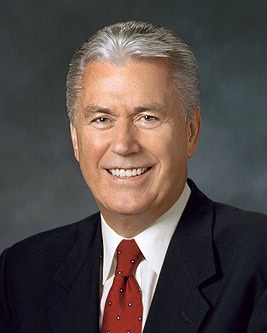 “Lord, Is It I?”
“Lord, Is It I?”
An acquaintance of mine used to live in a ward with some of the highest statistics in the Church—attendance was high, home teaching numbers were high, Primary children were always well behaved, ward dinners included fantastic food that members rarely spilled on the meetinghouse floor, and I think there were never any arguments at Church ball. My friend and his wife were subsequently called on a mission. When they returned three years later, this couple was astonished to learn that during the time they were away serving, 11 marriages had ended in divorce. Although the ward had every outward indication of faithfulness and strength, something unfortunate was happening in the hearts and lives of the members. And the troubling thing is that this situation is not unique. Such terrible and often unnecessary things happen when members of the Church become disengaged from gospel principles. They may appear on the outside to be disciples of Jesus Christ, but on the inside their hearts have separated from their Savior and His teachings. They have gradually turned away from the things of the Spirit and moved toward the things of the world. Once-worthy priesthood holders start to tell themselves that the Church is a good thing for women and children but not for them. Or some are convinced that their busy schedules or unique circumstances make them exempt from the daily acts of devotion and service that would keep them close to the Spirit. In this age of self-justification and narcissism, it is easy to become quite creative at coming up with excuses for not regularly approaching God in prayer, procrastinating the study of the scriptures, avoiding Church meetings and family home evenings, or not paying an honest tithe and offerings. My dear brethren, will you please look inside your hearts and ask the simple question: “Lord, is it I?”
 The Lord’s Way
The Lord’s Way
In fact, God has the way to live, to love, to help, to pray, to talk, to interact with each other, to lead, to marry, to raise children, tolearn, to know the truth, to share the gospel, to choose wisely what we eat, etc. Along with the scriptures, some great sources for finding the Lord’s way are True to the Faith, For the Strength of Youth, and other teachings of the living apostles and prophets. For example, the Lord has taught us in the scriptures:“For my thoughts are not your thoughts, neither are your ways my ways, saith the Lord.“For as the heavens are higher than the earth, so are my ways higher than your ways, and my thoughts than your thoughts”. One of the evils of these last days is that “every man walketh in his own way”. In Proverbs we are warned to “be not wise in thine own eyes” and to “lean not unto thine own understanding”. We are taught that if we do things the Lord’s way, He is bound to bless us and we have claim to His promises; and if not His way, we have no promise. The Lord contrasted His way with our way in His training of the prophet Samuel, who was sent to find a new king: “But the Lord said unto Samuel, Look not on his countenance, or on the height of his stature; because I have refused him: for the Lord seeth not as man seeth; for man looketh on the outward appearance, but the Lord looketh on the heart”. Even with the universally accepted desire to help the poor and needy, the Lord concurs in our goal but warns, “But it must needs be done in mine own way”. Otherwise, in our efforts to help, we may actually hurt them. The Lord has taught us the need to promote self-reliance. Even if we are able to help, we should not give or provide what they can and should do for themselves. Everywhere it is tried, the world learns the evils of the dole. Truly God knows best. Let’s consider some other examples. The Lord has the way to do missionary work. It is codified in the scriptures and in Preach My Gospel and implemented as guided by the Spirit. The Lord has His way, or the way, to love. Those of the world say that what really matters is that two people love each other. Our Father in Heaven teaches that this is important, but He teaches us more: that there is an authorized way and time to express that love.
 Never Leave Him
Never Leave Him
As we follow the Savior, without question there will be challenges that confront us. Approached with faith, these refining experiences bring a deeper conversion of the Savior’s reality. Approached in a worldly way, these same experiences cloud our view and weaken our resolve. Some we love and admire slip from the strait and narrow path and “[walk] no more with him.” . . How do we remain true to the Savior, His gospel, and the ordinances of His priesthood? How do we develop the faith and strength to never leave Him? Jesus said, “Except ye be converted, and become as little children, ye shall not enter into the kingdom of heaven.” We need the believing heart of a child. Through the power of His Atonement, we are to become “as a child, submissive, meek, humble, patient, full of love, willing to submit to all things which the Lord seeth fit to inflict upon [us], even as a child doth submit to his father.” This is the mighty change of heart. We soon see why a change of heart is necessary. Two words signal danger ahead: the words are offended and ashamed.
 “Remember Lot’s Wife”
“Remember Lot’s Wife”
Let’s recall who Lot’s wife was. The original story, of course, comes to us out of the days of Sodom and Gomorrah, when the Lord, having had as much as He could stand of the worst that men and women could do, told Lot and his family to flee because those cities were about to be destroyed. . . In the time we have this morning, I am not going to talk to you about the sins of Sodom and Gomorrah, nor of the comparison the Lord Himself has made to those days and our own time. I am not even going to talk about obedience and disobedience. I just want to talk to you for a few minutes about looking back and looking ahead. . . Apparently what was wrong with Lot’s wife was that she wasn’t just looking back; in her heart she wanted to go back. It would appear that even before they were past the city limits, she was already missing what Sodom and Gomorrah had offered her. As Elder Maxwell once said, such people know they should have their primary residence in Zion, but they still hope to keep a summer cottage in Babylon. It is possible that Lot’s wife looked back with resentment toward the Lord for what He was asking her to leave behind. We certainly know that Laman and Lemuel were resentful when Lehi and his family were commanded to leave Jerusalem. So it isn’t just that she looked back; she looked back longingly. In short, her attachment to the past outweighed her confidence in the future. That, apparently, was at least part of her sin. So, as a new year starts and we try to benefit from a proper view of what has gone before, I plead with you not to dwell on days now gone, nor to yearn vainly for yesterdays, however good those yesterdays may have been. The past is to be learned from but not lived in. We look back to claim the embers from glowing experiences but not the ashes. And when we have learned what we need to learn and have brought with us the best that we have experienced, then we look ahead, we remember that faith is always pointed toward the future. Faith always has to do with blessings and truths and events that will yet be efficacious in our lives. So a more theological way to talk about Lot’s wife is to say that she did not have faith. She doubted the Lord’s ability to give her something better than she already had. Apparently she thought—fatally, as it turned out—that nothing that lay ahead could possibly be as good as those moments she was leaving behind.
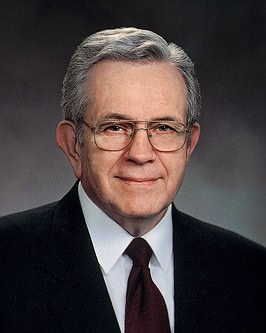 “The Standard of Truth Has Been Erected”
“The Standard of Truth Has Been Erected”
The Restoration did not come all at once. In a series of visitations, other prophets came to restore the keys of the priesthood. With the authority restored, the organization was revealed. Apostles were ordained, and the Quorum of the Twelve Apostles and First Presidency were organized as they had been anciently. The ordinances were revealed and authority given to perform them. The Book of Mormon: Another Testament of Jesus Christ was translated and published. In it is “the fulness of [the] everlasting gospel.” Other revelations were published—the Doctrine and Covenants and the Pearl of Great Price. From those books of scripture, we learned why the earth was created and who created it. There was opened to the early leaders of the Church the fulness of the gospel of Jesus Christ and the standards He requires of His disciples. We learned about the plan of redemption—“the great plan of happiness.” We came to earth to be tested and to gain experience, with a promise that “through the Atonement of Christ, all mankind may be saved, by obedience to the laws and ordinances of the Gospel.” Before we came into mortal life, we lived as spirit children of our Father in Heaven. “All human beings—male and female—are created in the image of God. Each [of you] is a beloved spirit son or daughter of heavenly parents, and, as such, [you have] a divine nature and destiny. Gender [male and female] is an essential characteristic of individual premortal, mortal, and eternal identity and purpose.” The great plan of happiness enables family relationships to last beyond the grave. Sacred ordinances and covenants, available only in the temple, make it possible for individuals to return to the presence of God and for families to be united eternally. Marriage, the family, and the home are the foundation of the Church. Nothing is more important to the Church and to civilization itself than the family! For some all is not complete in mortal life, for marriage and a family of their own have passed them by. But the great plan of happiness and the laws which govern it continue after death. Watched over by a kind and loving Heavenly Father, they will not, in the eternal pattern of things, be denied blessings necessary for their exaltation, including marriage and family. And it will be sweeter still because of the waiting and the longing.
 The Tender Mercies of the Lord
The Tender Mercies of the Lord
My mind was drawn immediately to Nephi’s phrase “the tender mercies of the Lord,” and I knew in that very moment I was experiencing just such a tender mercy. A loving Savior was sending me a most personal and timely message of comfort and reassurance through a hymn selected weeks previously. Some may count this experience as simply a nice coincidence, but I testify that the tender mercies of the Lord are real and that they do not occur randomly or merely by coincidence. Often, the Lord’s timing of His tender mercies helps us to both discern and acknowledge them. Since last October I have reflected repeatedly upon the phrase “the tender mercies of the Lord.” Through personal study, observation, pondering, and prayer, I believe I have come to better understand that the Lord’s tender mercies are the very personal and individualized blessings, strength, protection, assurances, guidance, loving-kindnesses, consolation, support, and spiritual gifts which we receive from and because of and through the Lord Jesus Christ. Truly, the Lord suits “his mercies according to the conditions of the children of men”. Recall how the Savior instructed His Apostles that He would not leave them comfortless. Not only would He send “another Comforter”, even the Holy Ghost, but the Savior said that He would come to them. Let me suggest that one of the ways whereby the Savior comes to each of us is through His abundant and tender mercies. For instance, as you and I face challenges and tests in our lives, the gift of faith and an appropriate sense of personal confidence that reaches beyond our own capacity are two examples of the tender mercies of the Lord. Repentance and forgiveness of sins and peace of conscience are examples of the tender mercies of the Lord. And the persistence and the fortitude that enable us to press forward with cheerfulness through physical limitations and spiritual difficulties are examples of the tender mercies of the Lord.
 The Will of God Revealed
The Will of God Revealed
But how may we know him? That is the next question. Has he at any time, or on any occasion, answered that question? If so, we want the answer, because it is vital. In searching the record as it is given to us by men who associated daily with the Lord, we find that upon one occasion men who were listening to him cried out against him. They opposed his works, as men today oppose him. And one voice cried out and said in effect, “How do we know that what you tell us is true? How do we know that your profession of being the Son of God is true.” And Jesus answered him in just a simple way (and note the test):“If any man will do his will, he shall know of the doctrine, whether it be of God, or whether I speak of myself.” That test is most sound. It is most philosophical. It is the most simple test to give knowledge to an individual of which the human mind can conceive. Doing a thing, introducing it into your very being, will convince you whether it is good or whether it is bad. You may not be able to convince me of that which you know, but you know it because you have lived it. That is the test that the Savior gave to those men when they asked him how they should know whether the doctrine was of God or whether it was of man. We have answered the question that if we shall do his will we shall know but now comes the question, what is “the will”? And therein is the whole essence of the gospel of Jesus Christ. Just as plainly as Jesus stated and defined what eternal life is, or how we shall know it, just as plainly as he laid down that test, just as plainly has he expressed what his will is.
